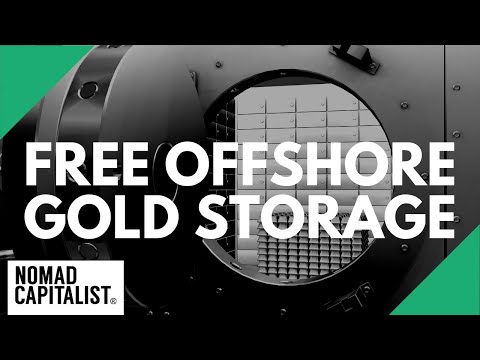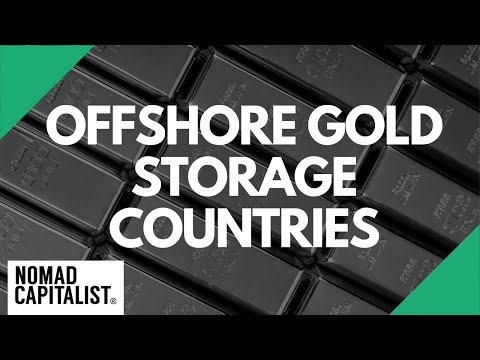How To Get Offshore Gold Storage In Singapore
July 10, 2023
At Nomad Capitalist we can advise on a wide range of investment matters, including buying gold and offshore gold storage. So if you are looking to diversify your portfolio and protect your existing assets while also taking advantage of reduced taxes and increased investment opportunities overseas, talk to us today.
Last Updated September 15, 2020
Dateline: Singapore
Is it possible to find free storage for your precious metals overseas?
Perhaps.
There are two different ways you can store your gold offshore. One is in a bank. The other is outside of the banking system.
But the closest thing I’ve seen to free gold storage was back in 2013 when I was in Singapore and I met with the folks behind NomadGold.com, an eCommerce gold storage service.
When they first started their business, they offered free gold storage in their private Singaporean vault to get people in the door. But eventually, they became so popular that they no longer needed to do that.
Today, their storage fees for certain types of gold start at around 20 basis points. That’s a decent deal if you’re investing somewhere in the five figures.
It’s a good place to get started.
But if you’re investing larger amounts of gold (six to eight figures), you probably don’t want to work through an eCommerce platform like NomadGold. You will want to find someone who is an expert to get you the White Glove service you’re looking for.
Luckily for you, we know where you can get that.
Today, I’m going to discuss your options for storing gold and then specifically address your gold storage options in Singapore, one of my favorite countries for gold storage.
GOLD STORAGE IN BANKS
Are there banks that will give you a free safe deposit box when you open an account? Yes.
Jovana Vojinovic, who heads our research team, came to me recently with the news that she had discovered a new bank where they give you six months of free storage in a decent-sized safe deposit box.
But there are challenges with a safe deposit box at a bank.
Number one: it’s not going to be free forever. There may be some exceptions. Some high-level private banks that require a two-to-five-million dollar deposit may give you a free box. We occasionally work with these high-level private banks, but I don’t often see that.
And I don’t often recommend private banking. Instead, I generally suggest that for $200,000 to $500,000 per account, you can get the same value for your money and spread your money out between different banks rather than putting millions in one bank.
The biggest challenge of a bank, however, is that you’ve got to travel to the country to deposit your gold and to take it out. If you’re going to be traveling with gold or silver that you already own, you could run into customs issues both where you’re leaving and where you’re arriving.
If the goal is to keep your money safe from things that could happen in the financial system, then keeping it in a bank probably isn’t the best idea.
What if something happens to the financial system, particularly in your country? The banks can shut down. Now you don’t have access to your gold.
Plus, not all banks even like the idea of gold storage. And not all countries even allow it.
Putting gold in a bank might also trigger legal reporting requirements for some folks, so you want to be careful of that.
Overall, I wouldn’t recommend storing your gold in a bank, even if you get a few months of free gold storage.
GOLD STORAGE IN PRIVATE VAULTS
On the other hand, private vaults are generally out of the realm of the financial system and come with many other benefits.
For one, they may be a non-reportable asset for certain folks. For instance, for US citizens, gold stored in a vault is legally non-reportable. You can also buy and sell gold to get fiat currency or even cryptocurrency.
Storing your gold in an offshore vault gives you a lot more flexibility.
But if you’re looking for absolutely free storage where you do not have to pay someone to buy and sell and move your gold, the only free option is to buy a property overseas – whether it’s land or a home – where you can put store gold out of the reach of your country.
Again, for US citizens, if you own international real estate that you don’t rent out, you don’t have to report the foreign property to the IRS either. Then, you can put the physical precious metals that are also non-reportable inside that property.
Whether you bury it in the backyard of your foreign property or put it in a coffee can in the basement the gold will be stored outside of the banking system.
There you have it, free offshore gold storage.
But in all seriousness, the short answer is that you want to stay away from storing your gold in the banking system. It’s generally not going to be free and you’ll lose many of the benefits of owning precious metals in the first place.
So, where do I recommend storing your precious metals? You can watch the video below to see my top recommendations, but my personal preference is to store my gold and other precious metals in Singapore.
WHY SINGAPORE?
The government of Singapore has been busy in recent years. Not content to rest on its laurels as the world’s freest economy, it set out on a mission to take the world bullion market by storm.
Today, this tiny Southeast Asian country at the tip of Malaysia holds only a few percent of the world’s bullion, but authorities here have made it their goal to achieve 10% of the global pie within just five years.
All told, that would be a 500% increase.
One big way the Singaporean government is doing this speaks highly of their commitment to economic freedom. Quite frankly, they just get it here.
While no government is perfect, at least Singapore’s “gets it”. They understand why people do the things they do and why capital reacts the way it does.
They understand my five magic words: go where you’re treated best.
And as a large offshore financial center, Singapore is working to become the world’s best place to invest. They make it so easy here.
Corruption is low, regulation is minimal, and the tax structure is among the best in Asia. Not to mention, it looks a lot better to your home government to be doing business in Singapore than some banana republic tax haven.
SINGAPORE’S GOLD STORAGE INCENTIVES
The first thing the Singapore government did was to eliminate taxes on bullion purchases. Traditionally, bullion was taxed at the normal 7% Goods and Services Tax rate – basically a VAT or national sales tax. There was one way to get around that by trading and storing your metals at the Singapore FreePort by the airport, but it limited your options.
As of October 1, 2012, however, the government has eliminated that tax, and now purchases of “investment grade” bullion are tax-free.
That means gold Maple Leafs, Philharmonics, Buffalos, gold bars, and most silver products are now exempt from tax when buying or selling. (Gold American Eagles are not of high enough purity to fall under the “investment grade” criteria).
Singapore has also made it easy to get your gold in and out of the country. Customs doesn’t even demand to know the beneficial owner of your precious metals when they pass through the airport.
Try pulling that off in a place like the United States.
Authorities here view gold and silver as commodities, not reportable currency, so there are presumably lower reporting requirements when bringing your gold with you. (Of course, you should always double-check appropriate authorities as things can change.)
If you don’t have a lot of gold ($100,000 is usually a good starting point), shipping your gold overseas can be a big pain.
And that’s where Singapore’s push to increase its position in the bullion markets is encouraging. There is a new “gold rush” going on here in Singapore, with companies rushing to compete and sell gold to foreigners without the need to put yourself or your holdings on an airplane.
Precious metal spreads here, while not as narrow as in Hong Kong, are not unreasonable.
And unlike Hong Kong, you can find a wide selection of coins, including silver (which Chinese investors tend to shun). Plus, in comparison to Hong Kong’s much-ballyhooed facility called The Storage that has shut down to foreigners, Singapore has an array of storage options.
However, most major banks in Singapore don’t sell precious metals – and the one that does (UOB) only does so for account holders. Plus, you can’t get a retail bank account at UOB as a foreigner unless you join their Privilege Banking program with a minimum S$350,000 (US$280,000).
Fortunately, bullion shops are popping up in addition to the pawn shops that sell gold. Upon hearing the news of the recent drop in gold prices, residents in Little India formed a veritable mob on such shops seeking to stock up on gold.
WHERE TO GET OFFSHORE GOLD STORAGE IN SINGAPORE

BullionStar in Singapore is run by veteran gold experts and offers precious metals storage in a high-security Singaporean vault.
Bullionstar has space in a segregated facility where each customer’s purchases are stored in their own private, sealed bag; none of the bags contain name identification of the owner.
What’s most exciting about BullionStar is that they’ll store any gold or silver for the most competitive rates around and they’ll store ANY size purchase.
The storage costs are as follows:
- BSP Gram Gold: 0.09% per annum
- Gold Bullion: 0.39% per annum
- BSP Gram Silver & Platinum: 0.19% per annum
- Silver & Platinum Bullion: 0.59% per annum
You could buy as little as a one-ounce silver coin and have it stored in your name, with photos of your stored items available online.
They even have gold bars with absolutely zero spread on the buy/sell price.
I’ve met with the manager of Bullionstar while here in Singapore, as well as the owner, Torgny Persson, who has experience running a precious metals business in Europe.
If you have a limited amount to invest in gold or silver, or you just want to dip your toe in with storing gold out of your own country, this may be a very attractive option to you.
If you are a high-end gold investor with six or seven figures, there are other services I can recommend. I’ve interviewed a few of them in our premium membership service, and the entire process is actually relatively easy. You can even ship gold and silver you own in the US (or anywhere else) to Singapore as easily as sending a FedEx.
The positive news about Singapore is that customs here really don’t care who owns it as long as the declaration form is filled out correctly.
And if you have enough gold to warrant it, the higher end facilities can carry it on an armored vehicle on a secure road right from Changi Airport. They will then store it in their own segregated vault in your choice of your own safe, your own cafe, or just out in the open somewhere in the vault.
The good news is that Singapore is an extremely safe jurisdiction. I walked around town and in crowded subways carrying my MacBook, as well as other valuables, and never felt unsafe for a moment. I certainly wouldn’t do that in many neighboring countries.
And that’s why many of the wealthy in Southeast Asia – as well as the West – are flocking to Singapore for gold storage.
Singapore gold facilities don’t go through a ton of regulation, but that’s not to say the facilities aren’t credible. Anything but.
If you’re interested in getting started storing gold in Singapore, you can reach Bullionstar here or you can reach out to the Nomad Capitalist team and we can help incorporate your gold storage plans into a holistic offshore strategy.


The Best Countries for Investing in the Middle East 2025
The global investment landscape has changed dramatically. Gone are the days when opportunities were limited by geography or confined to traditional stocks and bonds sold only through standardised, rigid and often cumbersome channels. Back then, going ‘global’ might have just meant adding a few European equities to a US-based portfolio. Today, everything has changed. Barriers […]
Read more

Best Gulf Country for Company Formation and Business Setup
For ambitious entrepreneurs, the Gulf region offers a powerful blend of top-tier banking systems and business-friendly laws that streamline company formation and make the process remarkably efficient. Countries like Bahrain, Kuwait, Oman, Qatar, Saudi Arabia and the United Arab Emirates (UAE) are actively competing to attract the world’s brightest business minds – and it’s working. […]
Read more

Top Offshore Tax Havens in the Caribbean
When people hear the term ‘tax haven’, it often conjures up images of shadowy offshore bank accounts and shady financial dealings. The reality is far more practical and much less sinister. Caribbean tax havens aren’t just for billionaires or corporations with armies of lawyers. In fact, many everyday entrepreneurs and investors take advantage of the […]
Read more






